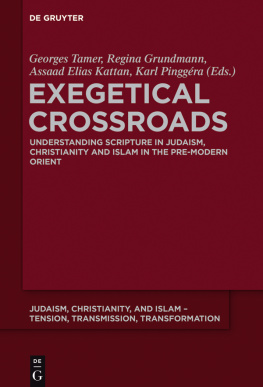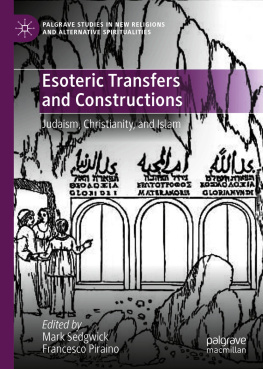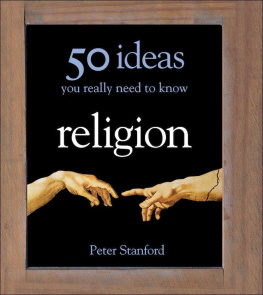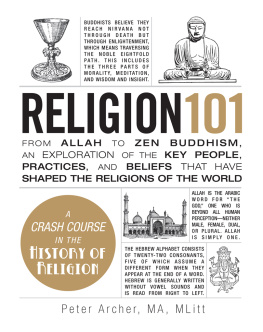Contents
COMMON GROUND
CHRISTIANITY
THE REFORMED TRADITION
JUDAISM
ISLAM
EASTERN TRADITIONS
MODERN DILEMMAS
ideas
you really need to know
religion
Peter Stanford

New York London
2010 by Peter Stanford
All rights reserved. No part of this book may be reproduced in any form or by any electronic or mechanical means, including information storage and retrieval systems, without permission in writing from the publisher, except by reviewers, who may quote brief passages in a review. Scanning, uploading, and electronic distribution of this book or the facilitation of the same without the permission of the publisher is prohibited.
Please purchase only authorized electronic editions, and do not participate in or encourage electronic piracy of copyrighted materials. Your support of the authors rights is appreciated.
Any member of educational institutions wishing to photocopy part or all of the work for classroom use or anthology should send inquiries to Permissions c/o Quercus Publishing Inc., 31 West 57th Street, 6th Floor, New York, NY 10019, or to .
ISBN 978-1-62365-193-0
Distributed in the United States and Canada by Random House Publisher Services
c/o Random House, 1745 Broadway
New York, NY 10019
www.quercus.com
Introduction
Everyone has an opinion about religion. It may be positive; it may be negative, but it is rarely neutral. The German philosopher Friedrich Nietzsche, who announced confidently in the 1880s that God was dead, would be surprised to see, 120 years after he wrote its obituary, that religion is still a vibrant and widely debated presence on the world stage.
This book is an attempt to go back to basics and present a balanced picture of what religion is and isnt, from its origins, through its history and its highs and lows, to what it stands for in the modern world. Polemicists such as Richard Dawkins, whose 2007 book The God Delusion has done so much to feed and embolden anti-religious prejudice, argue that no one can ever present a wholly objective picture of religion. He may well be right, but it has been my constant endeavor throughout what follows to leave my own feelings and denominational attachment to one side so as to present as rounded a picture as possible.
If there is one point about religion that needs to be made over and above all others it is that its various manifestations around the globe have much more in common with each other than they have that divides them. I have started and ended this book by focusing on that shared ground. In between these opening and closing reflections are sections chronicling the range of religions around the world. Each faith is explored in a broadly similar fashion, by following its history and development, and setting out the essentials of what it teaches and how that translates into everyday life. I hope that what follows will be an intriguing voyage of discovery, whether you know nothing of religion or whether you have already explored some of the areas covered and put down roots in one (or even several) of them.
Greater knowledge of this major force that continues to shape our world may also provide the chance to move beyond the stereotypes that dog discussion about religion. My aim is not that you arrive at the end of this journey converted, but simply that you feel better equipped to participate in that ongoing debate.
Peter Stanford
The God-shaped hole
It is the seventeenth-century French philosopher Blaise Pascal who is usually credited with coining the phrase a God-shaped hole to describe the spiritual vacuum inside every human being that yearns to be filled. The concept, however, goes back much furtherto the very origins of life on this planet. For many people argue that the religious impulse, a deep-seated need to find a more profound meaning to existence, went hand in hand with the birth of humankind.
Sincere religious believers, of course, hold that it was God who came first, creating men and women to populate the Earth. In the beginning was the Word and the Word was with God and the Word was God starts Johns gospel in the New Testament, while the Upanishads, the sacred texts of Hinduism, claim that the Hiranyagarbha, or golden womb, contained the origins of the universe, and of Brahma, the Hindu god of creation.
Others, though, suggest that the process happened the other way round. There have been many theories about the origin of religion. What all of them accept is that human beings have always created gods. So when the first men and women found themselves confronted by the randomness of their fatewith sickness and suffering just as likely to afflict them as joy and good healththey searched for and discovered an explanation for these otherwise inexplicable turns of fortune by attributing them to the actions of a distant deity.
You have made us for yourself, O Lord, and our heart is restless until it rests in you.
St. Augustine, 354430
A more precise starting point for the idea of a man-made God is found 14,000 years ago in the Middle East, where historians and archaeologists have detected evidence that the forces of naturethe wind, the sun, the starsas well as less tangible but nonetheless keenly felt entities or spirits believed to exist in the landscape, were personalized and worshipped as gods with human characteristics.
The origin of the idea of God
Many historians and theologians have sought to prove that the concept of God originated in the human mind. One of the most influential writers on the subject was the German anthropologist, ethnologist and Catholic priest, Wilhelm Schmidt (18681954), whose twelve-volume The Origin of the Idea of God was first published in 1912. His theory of primitive monotheism held that at the dawn of humankind, man fashioned a benevolent creator godoften referred to as the Sky god, since he was thought to reside above the Earth in a region that came to be known as the heavensto provide an explanation for the otherwise inexplicable things, both good and bad, that happened on Earth. This god was so remote from the dilemmas of human life that it seemed pointless to make images of him, or to worship him in rituals led by holy men and women. Alienated by this sensation of distance, people turned instead to more approachable deities, shaped in the image and likeness of humans. According to Schmidt, the cult of the Sky god persisted only among isolated peoples, such as some African and Latin American tribes, and the Aborigines of Australia.
A subsequent stage in this process occurred in the centuries between 800 and 300 BCE, known to history as the Axial Age. During this period, the search for meaning in life turned on figures such as Buddha, Socrates, Confucius and Jeremiah, who all shared a view that there was a transcendent or spiritual dimension to existence, and who tried for the first time to formulate that idea. The primitive notion of a deity grew more distinct and refined.
These attempts to define divine overlordship eventually resulted in the various denominations and faiths that are part of the religious world today. While they all still share the common ground of addressing ethical behavior and the question of how individuals should relate to each other, they differ in how this should be donein other words, what might loosely be termed doctrine. For instance, Christianity, Judaism and Islam are monotheistic religions. This means that they believe in a single all-powerful god. Hinduism and other Eastern faiths, by contrast, have a pantheon of gods.












